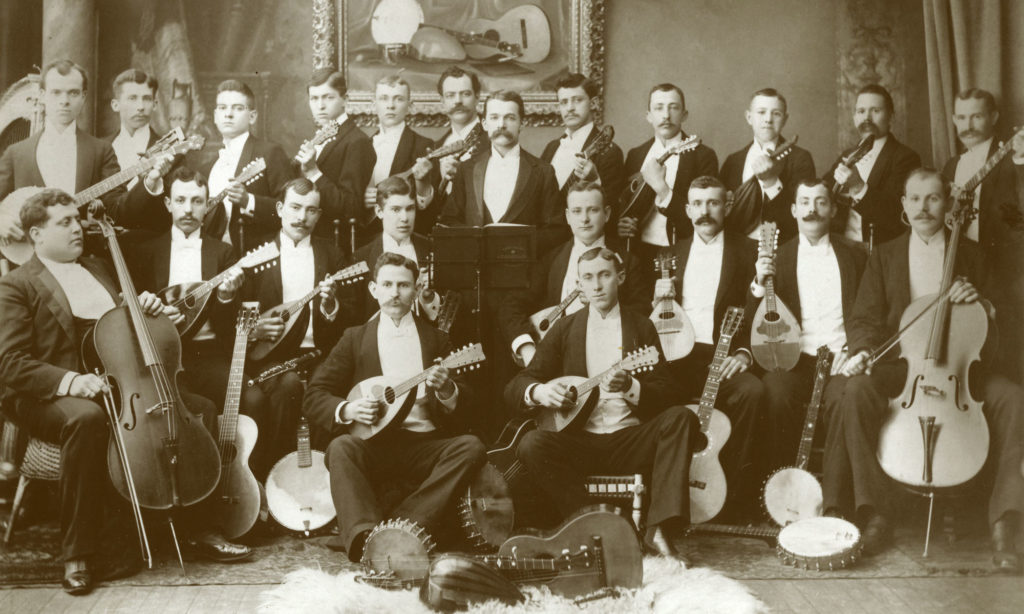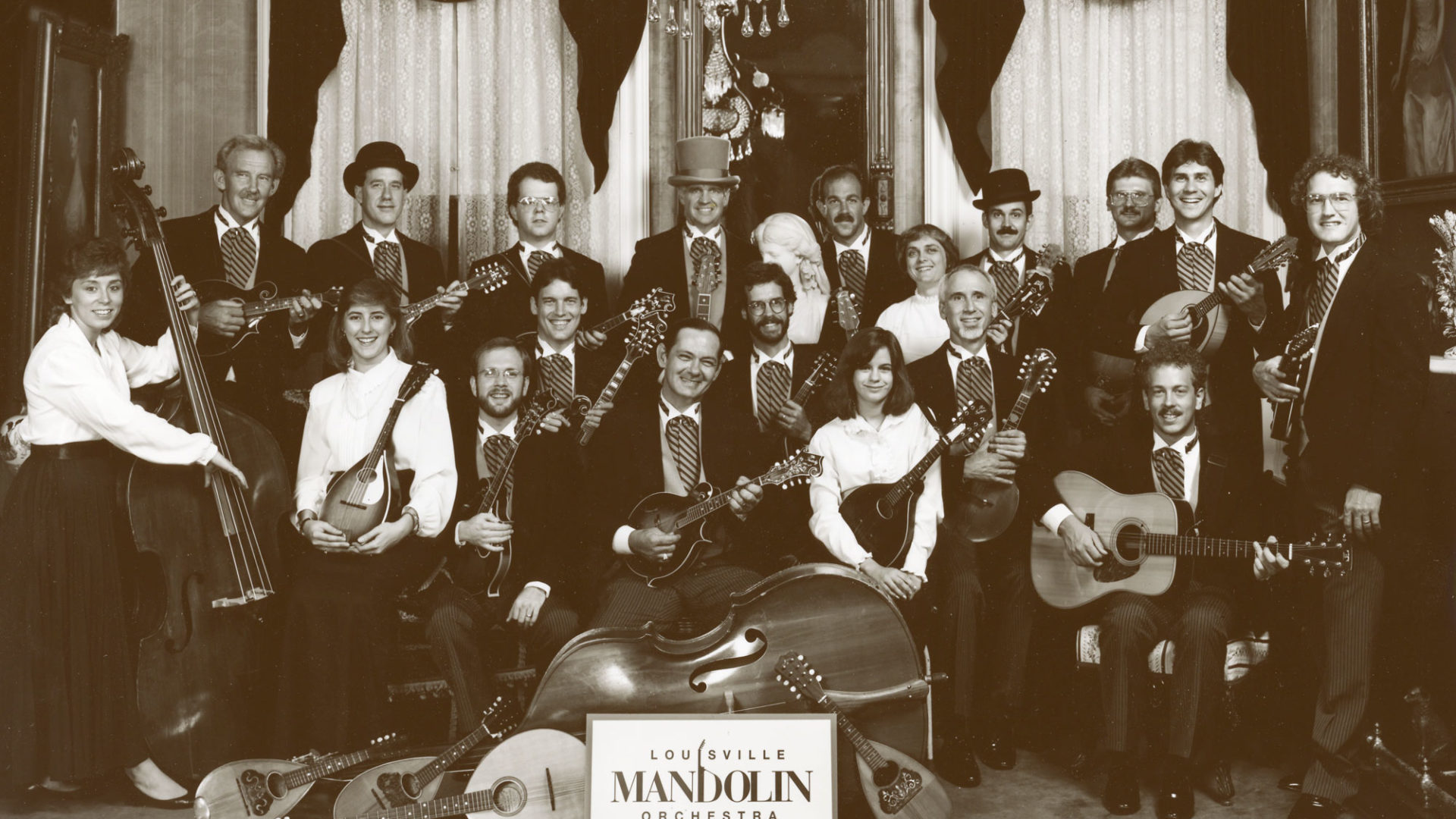
Mike Schroeder is Dreaming of a Classical Mandolin Orchestra
Bluegrass musician wants to revive a tradition
By Ronnie Lundy
Staff Writer
Mike Schroeder began playing mandolin when he was 19. For Kentucky mandolinists, that’s late. Consider that Ricky Skaggs, the Louisa native turned Nashville star and winner of numerous awards for his prowess on the instrument, was only 6 when he climbed up on a box on a regional television show and told Lester Flatt, “I want to pick.”
Bowling Green’s Sam Bush, who is leader of the New Grass Revival, three time winner of the annual Frets award for Best Mandolin Player and the pioneer of the hot-rocking progressive-bluegrass style, was 11 when his father brought him to Durlauf’s in Louisville to buy his first mandolin.
And rumor has it that Bill Monroe, the Rosine native credited with bringing the mandolin out of the string-band background and into the foreground of his bluegrass sound, was born with a silver pick In mouth.
By such standards, then, Schroeder is a Johnny-come-lately, but he may have a major impact on mandolin playing in Kentucky. He wants to make Louisville the home base for a regional classical mandolin orchestra.
Such orchestras were popular in the United States from the turn of the century through the 1920s and have recently enjoyed a small revival in a number of cities, including Los Angeles, New York, San Francisco, Baltimore, Phoenix, Cleveland, Providence, R.I., and Tacoma Park, Md. They usually consist of 20 to 30 players on mandolin, mandola, mandocello, guitar and bass.
“There’s an energy that’s so much greater in the experience of playing with an orchestra than when playing with just three or four other instrumentalists,” Schroeder said. “My dream is to have that experience right here.”
The dream grew out of classical mandolin studies that he began three years ago because the bluegrass and traditional-music outlets he’d found didn’t satisfy his interest in the instrument.
“My approach to learning an instrument has been to collect all the information I can, to learn as many ways to use it as I can,” he said.
Schroeder, assistant manager for the Development Finance Center of the Louisville Chamber of Commerce, plays in a bluegrass band and an old time string band.
Nine years ago he joined New Horizon, which mixes older and contemporary bluegrass styles. He’s proficient at both Monroe’s traditional approach and at the modern, improvisational techniques pioneered by young turks such as Bush, David Grisman and, to a lesser extent, Skaggs.
With the Buzzard Rock String Band, a group he joined in 1982, Schroeder has learned to play in the dance oriented ensemble style of old-time string music. But three years ago he decided to expand his repertoire by learning classical mandolin.
“The first mandolin player I heard was at the bluegrass festival down on the Belvedere, and I was just impressed with the speed,” Schroeder said. “I thought, ‘Gee, I’d love to see my fingers move that quickly, I want to play mandolin.'”
“But my interest never really was in bluegrass per se. I came into bluegrass because it was the vehicle to play mandolin. I went on to classical mandolin because I wanted to keep learning.”
After studying on his own, Schroeder attended intensive, two week-long classical-mandolin work shops – the first in Cleveland in 1986 and the second on Long Island in 1987. They were led by Keith Harris, a respected Australian classical mandolinist who travels the world teaching.
Schroeder said the first workshop he took “was like relearning every technique I’d done for 10 years. We’d spend eight hours working on one simple down-stroke. In one week with Keith I felt I’d learned more than in 10 years of playing bluegrass.”
But Schroeder said his bluegrass background has been a plus in the world of classical mandolin.
“When I would play for them (Harris and the other members of the workshop), they at first couldn’t understand how I could do that without reading anything.”
Because of his performances in the workshops, Schroeder was chosen last year to be on the board of directors for the Classical Mandolin Society of America At 31, he is one of the youngest board members.
This summer he’ll go to Washington, D.C., for another intensive one week session. He’ll also play there with the North American Mandolin Orchestra on July 17.
This won’t be the first time Schroeder has played in a mandolin orchestra After each of the intensive sessions, he has performed with an orchestra composed of workshop participants and regional mandolinists. Those experiences were so exciting, he said, that he became determined to create an orchestra in Louisville.
“Here I am traveling around the country to participate in these sorts of things, but it seems to me there must be people here and in the region to play with as well.”
He is trying to find those people through announcements in the national mandolin society newsletter, in music stores and in magazines. He’s also spreading the word through folk-music venues, in the belief that there are other bluegrass mandolin players who are interested in expanding horizons. (The Lonesome Pine Special included an invitation to join the proposed orchestra in its program at the end of the season in the Kentucky Center for the Arts.)
If Schroeder establishes his mandolin orchestra, it won’t be the first in Louisville. As something of an amateur mandolin historian, Schroeder combined references at local libraries and the Filson Club and learned that the mandolin scene once flourished in Louisville.
Schroeder said he has found “mentions of eight or nine mandolin orchestras, their directors and the places that they met here” at the turn of the century.
Schroeder found photos of the Louisville Mandolin Orchestra and the Orpheus Mandolin Orchestra, both societies that thrived here in the 1890s. And he’s found a Courier-Journal story from 1940 that recounts the history of the Louisville Mandolin and Guitar Club – a group that was popular in the region in the Gay ’90s.
He also has a copy of “The Colonel’s Mandolin Band.” It’s an album of old hymns played by a children’s mandolin orchestra from Shelbyville, Ky., and recorded in the late 1960s. The group’s mandolins and production of the record were underwritten by Col. Harland Sanders, who appears in the album cover photo with the band.
The album sets a precedent for corporate “underwriting” of a local mandolin orchestra, Schroeder said jokingly. Then he added seriously that he hopes to attract funds from local corporations and arts organizations if he succeeds in forming an orchestra.
Schroeder said the proposed orchestra would meet bi-monthly to practice and would perform quarterly concerts in the region.


